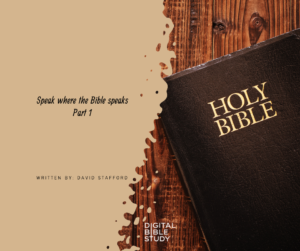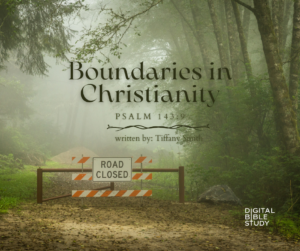Who Should We Blame?
written by: Tiffany Smith
Introduction
As humans it is natural for us to want a source to blame when something goes wrong. It is also typical that the source we blame is outside ourselves. We do not like to take blame upon ourselves for wrongdoing. We’d rather some or all of the blame be laid towards other factors. I want to take a short study to look at where blame should be placed for sin in our lives.
Free Will
I want to begin with the foundation of understanding that we have been given free will by our Creator, God. Therefore, we have the right to choose in whatever may come our way daily. I have previously discussed why free will is a factor in God’s love of His creation, mankind, please see the study: Why would God Create Life Knowing There Would Be Loss? for more on this topic.
But, I simply wanted to begin here because we must understand that we have the ability to choose in the decisions that we face. Some decisions may carry weightier obstacles than others, but again the decision of which action to take is ours to decide.
An example of an easy decision might be going to Bible study on Wednesday night: yes or no … Yes!
But, an example of a more difficult decision could be your family is getting together for someone’s birthday on Sunday:
do you go to church on Sunday or do you skip part or all of the get together with your family to be at church on Sunday … for some this decision may be more difficult, because you want to show love to your family and spend time with them, but let us not forget that God should be a greater priority than our family.
“He that loveth father or mother more than me is not worthy of me: and he that loveth son or daughter more than me is not worthy of me.”
Matthew 10:37
Examples of Blame
Adam and Eve are the first and probably most notorious examples of casting blame when God came to them asking about the sin they had committed. In Genesis 3:12 we read the blame Adam cast first,
“And the man said, The woman whom thou gavest to be with me, she gave me of the tree, and I did eat.”
Adam cast blame on both God and Eve in his statement. In Genesis 3:13 we read the blame Eve then cast,
“And the woman said, The serpent beguiled me, and I did eat.”
Eve cast blame on the serpent. In both examples, neither Adam nor Eve admitted to responsibility on their part for their actions, instead they sought to try to cast the blame away from themselves.
Who Is to Blame
James 1:14-15
“But every man is tempted, when he is drawn away of his own lust, and enticed. Then when lust hath conceived, it bringeth forth sin: and sin, when it is finished, bringeth forth death.”
Romans 1:24-25
“Wherefore God also gave them up to uncleanness through the lusts of their own hearts, to dishonour their own bodies between themselves: Who changed the truth of God into a lie, and worshipped and served the creature more than the Creator, who is blessed for ever. Amen.”
Psalm 81:12
“ So I [God] gave them [Israel] up unto their own hearts’ lust: and they walked in their own counsels.”
Notice the theme from these verses:
man condemns himself by acting upon his own lusts. Therefore, the only person we have to blame is ourselves. We have already mentioned free will and it is free will that allows the choices before us. As I mentioned previously, I talk about the concept of free will more in another article, but to summarize without free will we would not have the ability to choose God. He would simply be who we were made to follow. And even though he created us to follow him, he gave us the ability to choose to follow him.
Therefore, when we are faced with dilemmas that may lead to sin, unfortunately when we pick the wrong path, we are the one to blame for the choice: not God, not our parents, not our friends, not even Satan. God, we know, does not tempt us.
James 1:13
“Let no man say when he is tempted, I am tempted of God: for God cannot be tempted with evil, neither tempteth he any man”.
Satan we know, however, does tempt us and usually uses people and things dear to us to do so. Satan is even referred to as “the tempter” when he comes to tempt Jesus in Matthew 4. But, refer back to James 1:14 and notice what is written there,
“But every man is tempted, when he is drawn away of his own lust, and enticed.”
Satan may be the one that tempts, but it is our own desires that draw us away from the right path, the righteous path. And I suppose we could cast some blame on Satan. We are warned throughout scripture to be watchful of him because he seeks to tempt us, but again the point remains that he may tempt us but he does not make us choose his unrighteous path. So, truthfully, we, our own selves, are to blame for the sin we commit. Satan also is to blame for the sin he committed. He was drawn away from the righteous path of following God by his desire to be a figure of authority, not under the complete authority of God the Father.
Conclusion
We are to blame for our own sins. It is not alway easy to choose the righteous path, but we should seek to pick the righteous paths rather than the sinful, the self-serving. You may have a verse or verses of your own that you use as a reminder when faced with difficult decisions not to follow the unrighteous path.
I would like to leave you with one passage to end this study as a reminder of what we should seek to do.
Romans 13:12-14
“The night is far spent, the day is at hand: let us therefore cast off the works of darkness, and let us put on the armour of light. Let us walk honestly, as in the day …. But put ye on the Lord Jesus Christ, and make not provision for the flesh, to fulfil the lusts thereof.”

Tiffany Smith
My name is Tiffany Smith. I have been married to my husband Nathan for almost two years now. My husband and I live near Albany, Georgia; although, our original hometown is Jonesboro, Arkansas. We worship with the Lee County church of Christ in Georgia. My husband and I both love God, and I love seeing us grow as Christians and workers in the church. I seek to keep myself active in studying God’s word and want to share my studies with others. So I hope you join me for this study and others to come!

Applications of Jesus’ Example Prayer
Prayer is such an important part of our Christian walk. It is our way of communicating with our Heavenly Father. So, do not neglect it. Pray to Him. Talk to Him. Use the aspects we identified in Jesus’ example prayer to guide you in your prayers.

Are We Speaking Where the Bible Speaks? Part 1
There is an important question that needs to be addressed, and that question is “Are we speaking where the Bible speaks?”

Boundaries in Christianity
Take a moment to think on areas of your life where you may already have boundaries set to help keep yourself closer to God. Also, take some time to consider areas of weakness that you may be able to develop boundaries for to help keep you distanced from tempting situations and more focused on sticking to the path of righteousness.

